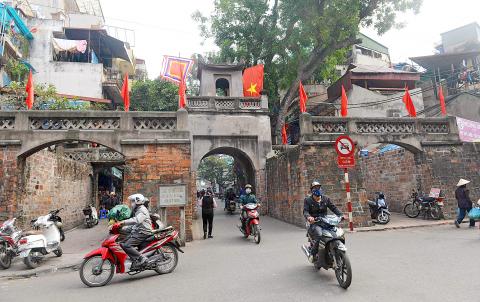The Lunar New Year sees red and gold cascade across Vietnam as the unmistakable communist flag gets a proud airing — an act of patriotism promoted each year by officials via loudspeakers or doorstep visits.
While it is not compulsory, those who refuse to hang gold-starred banners from their windows court trouble from authorities and social opprobrium from the communist faithful.
So, many comply — though resentment sometimes follows the patriotic arm-twisting.

Photo: AFP
“I don’t like being forced to hang flags, but the authorities will tell us to again and again over the loudspeakers,” Hanoi resident Minh said.
“I don’t want to get into trouble, so I just do as I’m told,” he added, refusing to provide his full name out of fear of retribution.
The Tet Lunar New Year, which starts on Saturday and runs for five days, is one of several dates in the calendar when flag-flying abounds.
“Most houses obey the encouragement because they don’t want any trouble,” Quan, a local official in Hanoi said, also refusing to provide his full name.
The tradition of hanging flags in northern Vietnam dates back to 1954, when the French were thrown out of the nation following a fiercely fought campaign led by independence hero Ho Chi Minh. In those years, the banners were happily hung by patriotic northerners celebrating independence.
After the end of the Vietnam War and unification in 1975, the yellow-starred banner became the national flag, replacing in the south the flag used by US-backed forces — a red and blue rectangle with a yellow star.
Since then, communist authorities have leaned heavily on shows of pomp and nationalism, and although enthusiasm is flagging, not everyone is bitter about the banners.
Flag-makers like Nguyen Van Phuc do swift business in the weeks leading up to Tet, churning out hundreds of the handmade banners every day.
He is careful to comply with strict state rules about the flag’s design: rectangular and red, with a five-point golden star angled the right way up.
“Whether [the flag] is big or as small as a finger, it must comply with state regulation. Only then does it become sacred,” Phuc said.

IDENTITY: A sex extortion scandal involving Thai monks has deeply shaken public trust in the clergy, with 11 monks implicated in financial misconduct Reverence for the saffron-robed Buddhist monkhood is deeply woven into Thai society, but a sex extortion scandal has besmirched the clergy and left the devout questioning their faith. Thai police this week arrested a woman accused of bedding at least 11 monks in breach of their vows of celibacy, before blackmailing them with thousands of secretly taken photos of their trysts. The monks are said to have paid nearly US$12 million, funneled out of their monasteries, funded by donations from laypeople hoping to increase their merit and prospects for reincarnation. The scandal provoked outrage over hypocrisy in the monkhood, concern that their status

The United States Federal Communications Commission said on Wednesday it plans to adopt rules to bar companies from connecting undersea submarine communication cables to the US that include Chinese technology or equipment. “We have seen submarine cable infrastructure threatened in recent years by foreign adversaries, like China,” FCC Chair Brendan Carr said in a statement. “We are therefore taking action here to guard our submarine cables against foreign adversary ownership, and access as well as cyber and physical threats.” The United States has for years expressed concerns about China’s role in handling network traffic and the potential for espionage. The U.S. has

Trinidad and Tobago declared a new state of emergency on Friday after authorities accused a criminal network operating in prisons across the country of plotting to kill key government officials and attack public institutions. It is the second state of emergency to be declared in the twin-island republic in a matter of months. In December last year, authorities took similar action, citing concerns about gang violence. That state of emergency lasted until mid-April. Police said that smuggled cellphones enabled those involved in the plot to exchange encrypted messages. Months of intelligence gathering led investigators to believe the targets included senior police officers,

A disillusioned Japanese electorate feeling the economic pinch goes to the polls today, as a right-wing party promoting a “Japanese first” agenda gains popularity, with fears over foreigners becoming a major election issue. Birthed on YouTube during the COVID-19 pandemic, spreading conspiracy theories about vaccinations and a cabal of global elites, the Sanseito Party has widened its appeal ahead of today’s upper house vote — railing against immigration and dragging rhetoric that was once confined to Japan’s political fringes into the mainstream. Polls show the party might only secure 10 to 15 of the 125 seats up for grabs, but it is